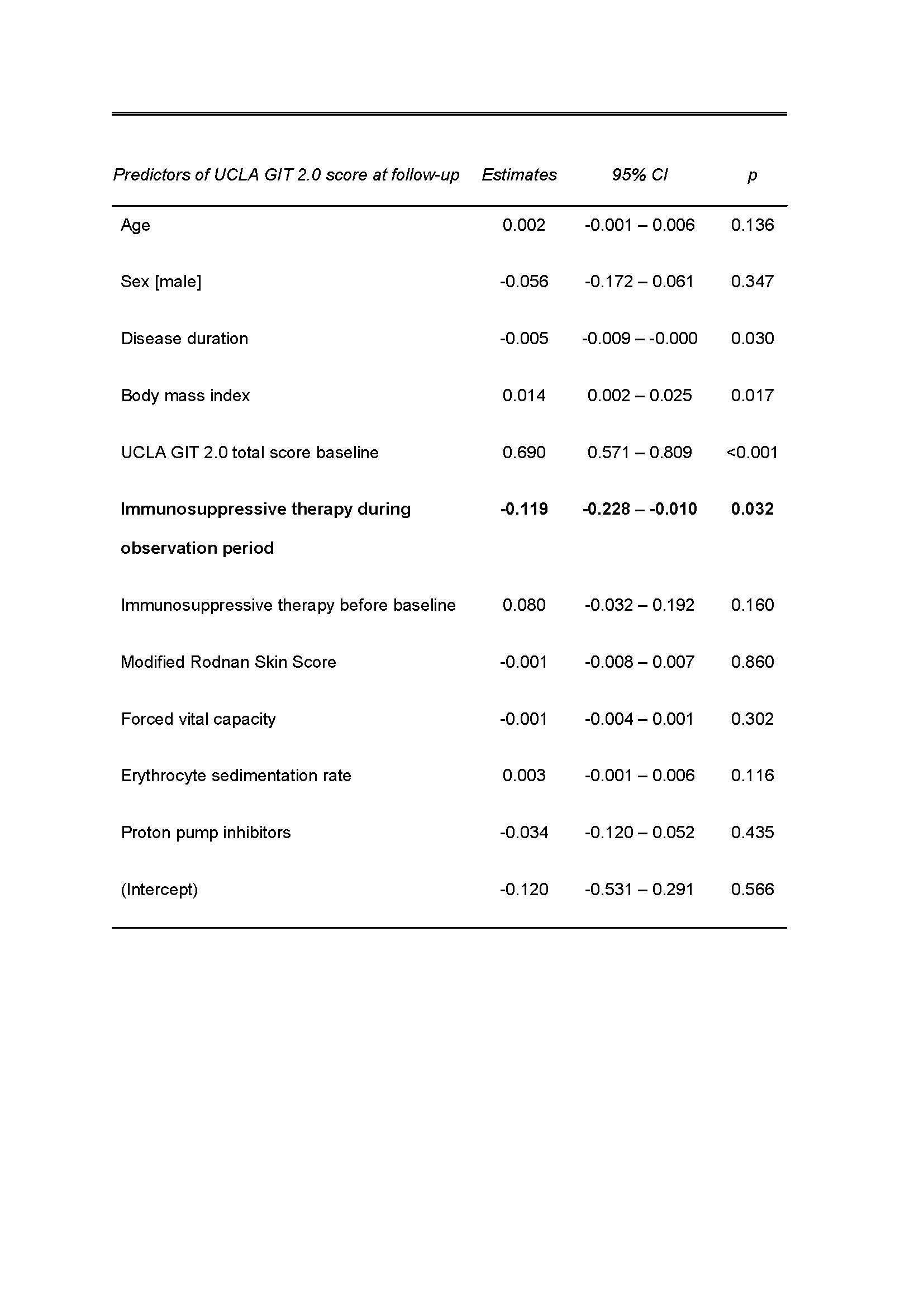Session Information
Date: Monday, November 14, 2022
Title: Systemic Sclerosis and Related Disorders – Clinical Poster III
Session Type: Poster Session D
Session Time: 1:00PM-3:00PM
Background/Purpose: The gastrointestinal (GI) tract is frequently affected in systemic sclerosis (SSc), leading to considerable morbidity and even mortality. While important progress has been made in the last years regarding treatment of SSc, there is no disease-modifying treatment available for SSc-related GI involvement. In this observational study of unselected patients with SSc, we aimed to identify an association between immunosuppressive therapy and the severity of GI symptoms, measured by the University of California at Los Angeles / Scleroderma Clinical Trial Consortium Gastro-Intestinal Tract 2.0 Instrument (UCLA GIT 2.0).
Methods: We selected patients from our EUSTAR centre who met the 2013 ACR/EULAR classification criteria for SSc and had at least two visits with completed UCLA GIT 2.0 questionnaires, with an interval of 12±3 months between visits. We defined the first visit with a completed UCLA GIT 2.0 questionnaire as baseline visit. Immunosuppressive therapy was defined as exposure for at least 6 months between the two visits to at least one of the following drugs, regardless of indication: mycophenolate mofetil (MMF), cyclophosphamide, methotrexate, azathioprine, leflunomide, glucocorticoids ( >10mg/d prednisone-equivalent), rituximab, tocilizumab, and abatacept. The study outcome was the UCLA GIT 2.0 score at the follow-up visit. We performed multivariable linear regression with this outcome as dependent variable and immunosuppressive therapy during follow-up, immunosuppressive therapy before baseline, baseline UCLA GIT 2.0 score and several baseline parameters selected by clinical judgment as potentially influencing GI symptoms, as independent variables. Multiple imputation was implemented to handle missing values.
Results: We included 209 patients. Baseline characteristics were: 82.3% female, median (IQR) age 59.0 (48.6, 68.2) years, median disease duration 6.0 (2.7, 12.5) years, 40 (19.1%) diffuse cutaneous SSc, median baseline UCLA GIT 2.0 score 0.19 (0.06, 0.43). Of these, 71 patients were exposed to immunosuppressive therapy during the observation period: 27/71 received methotrexate, 1/71 cyclophosphamide, 17/71 MMF, 3/71 leflunomide, 3/71 azathioprine, 6/71 glucocorticoids >10mg/d, 16/34 rituximab, 18/34 tocilizumab. Compared to patients without such treatment, patients on immunosuppressive therapy during the observation period had overall more severe SSc, higher prevalence of treatment with proton pump inhibitors, similar UCLA GIT 2.0 scores at baseline and at follow up. They also tended to have less severe GI symptoms at baseline and follow-up by medical history. In multivariable linear regression, immunosuppressive therapy, lower body mass index, longer disease duration and lower baseline UCLA GIT 2.0 score were significantly associated with lower (better) UCLA GIT 2.0 scores at follow-up (Table 1).
Conclusion: Immunosuppressive treatment was associated with lower UCLA GIT 2.0 scores, which suggests potential effects of immunosuppressants on GI manifestations in patients with SSc. However, these results need verification in additional studies and in randomised controlled clinical trials.
To cite this abstract in AMA style:
Stamm L, Garaiman A, Zampatti N, Becker M, Bruni C, Dobrota R, Elhai M, Ismail S, Jordan S, Tatu A, Distler O, Mihai C. Influence of Immunosuppressive Therapy on Gastrointestinal Symptoms in Patients with Systemic Sclerosis [abstract]. Arthritis Rheumatol. 2022; 74 (suppl 9). https://acrabstracts.org/abstract/influence-of-immunosuppressive-therapy-on-gastrointestinal-symptoms-in-patients-with-systemic-sclerosis/. Accessed .« Back to ACR Convergence 2022
ACR Meeting Abstracts - https://acrabstracts.org/abstract/influence-of-immunosuppressive-therapy-on-gastrointestinal-symptoms-in-patients-with-systemic-sclerosis/

